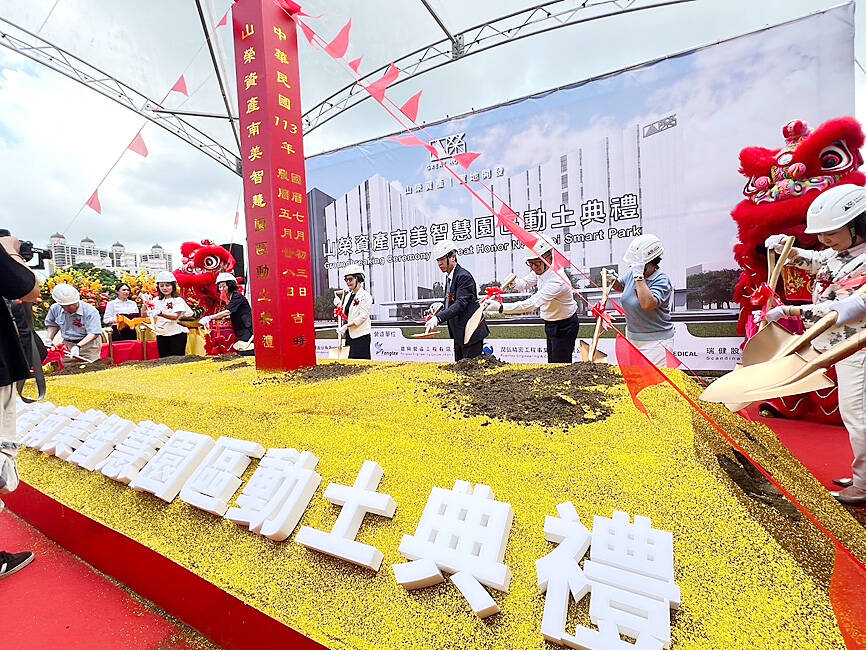Great Honor Asset Management Co (山榮資產管理) yesterday held a groundbreaking ceremony for a smart park project in Taoyuan’s Gueishan District (龜山), with total investment exceeding NT$20 billion (US$612.9 million).
The company said it expects to complete first-phase construction of the Nanmei Smart Park (南美智慧園區) — comprising warehouses, production lines and office buildings — in two years.
The site is close to national freeways No. 1 and 2, and is only about 20 minutes’ drive from Taiwan Taoyuan International Airport, Great Honor Asset Management said.

Photo: Hsu Yi-ping, Taipei Times
It takes about 50 minutes to reach the Port of Taipei and the Port of Keelung from the Nanmei Smart Park site, it added.
Covering 6,000 ping (19,830m2), the first phase consists of two buildings, with one for SHL Medical TW, a world-leading solutions provider of advanced drug delivery systems, Great Honor Asset Management said.
The other building is designed for medical, artificial intelligence and other high-tech firms, it said.
Being a “turnkey” developer that specializes in customized factory-office complexes, logistics centers for enterprises and management services, Great Honor Asset Management does not sell properties outright, but leases them through long-term contracts to retain its assets and receive stable rental income.
When the first-phase construction is completed, annual rental income is expected to be NT$400 million to NT$500 million, the company said.
The ceremony was attended by Great Honor Asset Management chairman Vincent Lin (林榮宗), SHL Medical Taiwan general manager Sebastian Feng (馮文宏), the companies’ management teams and local community leaders.
SHL said that the Nanmei Smart Park project marks a significant milestone for the company after it established a foothold in Taoyuan in 1989.
“As SHL Medical continues to grow, we remain committed to optimizing our operations and strengthening our global market leadership,” Feng said in a statement. “The new Taoyuan-Nanmei site will consolidate parts of our existing resources in Taiwan, allowing us to streamline our operations.”
In addition, the company said that it plans to invest US$100 million over the next five years to streamline processes by integrating capabilities and upgrading its Taiwan facilities.
It also plans to continue fostering local professionals, driving growth locally and globally, it added.
“The establishment of the new site further strengthens our commitment to providing best-in-class services and advancing Taiwan’s medtech industry,” SHL Medical chief executive officer Ulrich Faessler said in the statement.

GROWING OWINGS: While Luxembourg and China swapped the top three spots, the US continued to be the largest exposure for Taiwan for the 41st consecutive quarter The US remained the largest debtor nation to Taiwan’s banking sector for the 41st consecutive quarter at the end of September, after local banks’ exposure to the US market rose more than 2 percent from three months earlier, the central bank said. Exposure to the US increased to US$198.896 billion, up US$4.026 billion, or 2.07 percent, from US$194.87 billion in the previous quarter, data released by the central bank showed on Friday. Of the increase, about US$1.4 billion came from banks’ investments in securitized products and interbank loans in the US, while another US$2.6 billion stemmed from trust assets, including mutual funds,

Micron Memory Taiwan Co (台灣美光), a subsidiary of US memorychip maker Micron Technology Inc, has been granted a NT$4.7 billion (US$149.5 million) subsidy under the Ministry of Economic Affairs A+ Corporate Innovation and R&D Enhancement program, the ministry said yesterday. The US memorychip maker’s program aims to back the development of high-performance and high-bandwidth memory chips with a total budget of NT$11.75 billion, the ministry said. Aside from the government funding, Micron is to inject the remaining investment of NT$7.06 billion as the company applied to participate the government’s Global Innovation Partnership Program to deepen technology cooperation, a ministry official told the

Taiwan Semiconductor Manufacturing Co (TSMC, 台積電), the world’s leading advanced chipmaker, officially began volume production of its 2-nanometer chips in the fourth quarter of this year, according to a recent update on the company’s Web site. The low-key announcement confirms that TSMC, the go-to chipmaker for artificial intelligence (AI) hardware providers Nvidia Corp and iPhone maker Apple Inc, met its original roadmap for the next-generation technology. Production is currently centered at Fab 22 in Kaohsiung, utilizing the company’s first-generation nanosheet transistor technology. The new architecture achieves “full-node strides in performance and power consumption,” TSMC said. The company described the 2nm process as

POTENTIAL demand: Tesla’s chance of reclaiming its leadership in EVs seems uncertain, but breakthrough in full self-driving could help boost sales, an analyst said Chinese auto giant BYD Co (比亞迪) is poised to surpass Tesla Inc as the world’s biggest electric vehicle (EV) company in annual sales. The two groups are expected to soon publish their final figures for this year, and based on sales data so far this year, there is almost no chance the US company led by CEO Elon Musk would retain its leadership position. As of the end of last month, BYD, which also produces hybrid vehicles, had sold 2.07 million EVs. Tesla, for its part, had sold 1.22 million by the end of September. Tesla’s September figures included a one-time boost in